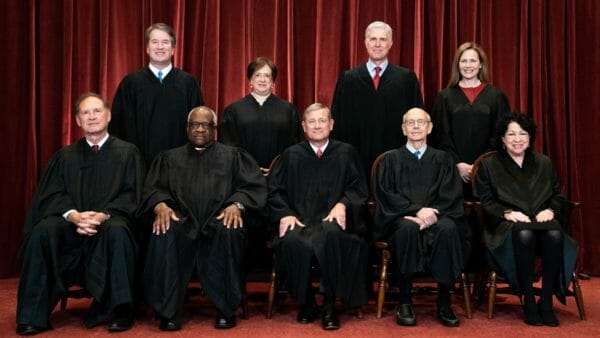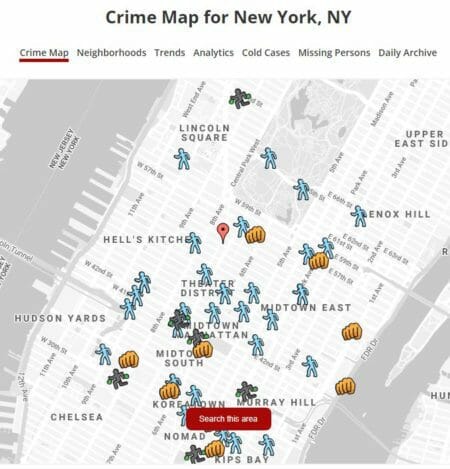
U.S.A. –-(AmmoLand.com)- I listened to the oral arguments in the case of New York State Rifle and Pistol Association versus Bruen. I found the judges on the US Supreme court both fascinating and frightening. To me, their questions showed the narrow life experiences of a supreme court judge. Before I commit the same error that these judges made, I must admit that the justices are not all the same, and their experiences are certainly different than mine.
This particular legal case asks the court to decide if ordinary people can legally carry ordinary firearms in ordinary places. Time and again, the judges asked the petitioner’s counsel if he were asking that guns belong in extraordinary places. To take a few examples, the judge was implying that honest gun owners should be disarmed at schools, at public gatherings, on the subway, and at sporting events.
Lawyers want to restrict their arguments to the narrow question asked in the case. What I found fascinating were the judges’ assumptions.
The judge assumes that schools are safe and that guns should be outlawed there. I’ve studied our history and I know that schools are dangerous places where innocent children have been attacked. My experience may be unusual since I’ve worked to make schools safer with programs that trained school staff to be first responders, to stop an attack and treat the injured unto police and EMTs arrive.
My experience may be unusual since I know co-eds who were raped as they walked home from class late at night. They were disarmed because the campus was a “gun free zone”. No, the campus wasn’t a “gun free zone” to the rapist who brought his gun. It sounds as if the justices think that laws enforce themselves and that criminals obey our laws.
That isn’t my experience. My friends have a painful history to prove it. Evidently, that history and what we learned from it isn’t obvious to some supreme court judges.
One judge asked if the state could outlaw concealed carry at public gatherings like Times Square on New Year’s eve, or at bars and restaurants where alcohol is served. Again, I heard the question as a confession by the judges.
The judge thinks that restaurants and bars are made safe by ink on paper. If we’re going to outlaw guns, then wouldn’t bars be safer if we also outlawed carrying keys in a bar so we wouldn’t drive while intoxicated? I’m afraid the judge would say that we should outlaw keys in bars too. To me, it sounds as if the judge thinks we depend on laws to get home safely.

Do the judges really think that police have made Times Square a safe place for me and my family? I don’t believe that for a minute! Fortunately, ordinary people like us developed our own solutions that are both more sophisticated and more tailored to our specific needs than the crude tool of law. My experience, while limited, is that bars and restaurants are made safe by the designated driver who is carrying both her keys in her pocket and a firearm on her hip. It is she who protects her friends who might imbibe. When my friends go to places like Times Square, they are kept safe by men and women who are looking outward to spot trouble before it reaches them.
For the judges, what is out of sight is out of mind. For example, they ask if we should be allowed to carry at sporting events. They claim that getting wanded at a turnstile makes us safe. I remember where unarmed fans were beaten to the ground and brain-damaged by gangs at the stadium. Clearly, the state did not make those locations safe for the common man. Our safety is primarily our concern rather than the state’s concern.
Going to an extreme example, if a town puts up a sign that says, “no guns allowed”, is that enough protection so we should be compelled to give up our right of armed defense? Regardless of what we say, I observe that a plastic sign isn’t enough protection so that judges, politicians, and their security teams decide to go unarmed.
At the other extreme, we’ve seen mass murder occur where there were both police and metal detectors providing security as you entered a fairgrounds. Despite those precautions, the murderer simply walked away from the security checkpoint and crawled under the fence. The city delivered a security theater rather than a real defense. In fact, we see fewer injured victims and injured bystanders when armed civilians defend themselves. I’m left wondering why the judges didn’t understand that history when they asked their questions.
This is pure projection on my part, but I was left wondering if judges were asking where they could go to get away from those dangerous gun owners. They speak as if they are oblivious to the reality of armed defense in the USA.
Clearly, my experience is different than theirs. So is yours. I’ve been in a room with hundreds of armed men and women. That isn’t some exotic training site, but an ordinary class at a school that taught armed defense to civilians. I’ve been on a convention floor with tens of thousands of armed men and women who were at that convention with their families. That is simply an NRA annual meeting. Even those rather ordinary situations are outside the judges’ experience.
I want to put this at a personal level. The judges said that open carry was a substitute for concealed carry so that ordinary people could exercise armed defense. Would the judges apply those rules to themselves and their family? The people who guard the judges are not routinely limited to open carry, and for good reasons. Their security staff carries everywhere the law allows. They are not restricted to carry when a defined threat is made against a particular justice at a particular time and place.
If judges are extraordinary, then so is every college co-ed. Who is assaulted more often, a judge or a college co-ed?
I thought the judges exhibited a profound lack of empathy for the common man or woman. Would they require that their relatives be restricted to open carry and denied all other forms of defense?
Like many of us, the judges don’t know what they don’t know. Perhaps they only know what they see on the news. Then again, I suspect that you have seen and done many things the judges don’t even know exist.
There is wisdom in humility.
About Rob Morse
The original article, with sources, is posted here. Rob Morse writes about gun rights at Ammoland, at Clash Daily, at Second Call Defense, and on his SlowFacts blog. He hosts the Self Defense Gun Stories Podcast and co-hosts the Polite Society Podcast. Rob was an NRA pistol instructor and combat handgun competitor.
